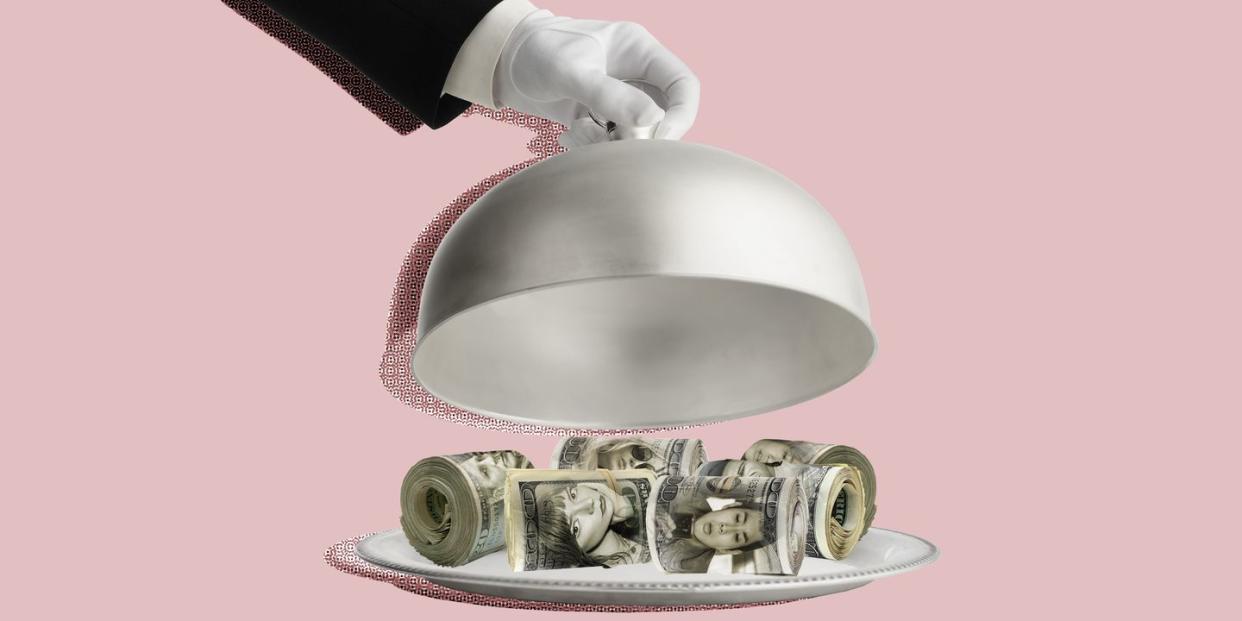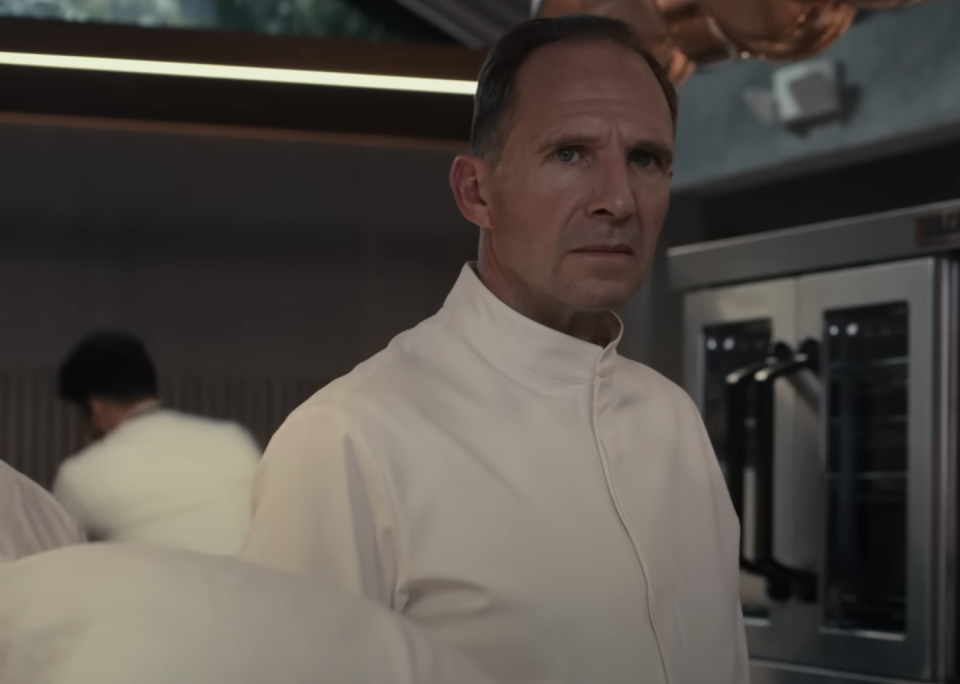Eating the Rich Shouldn’t Be So Satisfying

- Oops!Something went wrong.Please try again later.
- Oops!Something went wrong.Please try again later.
"Hearst Magazines and Yahoo may earn commission or revenue on some items through the links below."
The phrase “eat the rich” is commonly credited to the philosopher Jean-Jacques Rousseau, who, during the French Revolution, cryptically warned, "When the people shall have nothing more to eat, they will eat the rich."
Perhaps! Or they will merely cook up the wealthy as content. Which, of course, has been happening for some time now. “Eat The Rich” was the name of a 1987 movie, a 1993 Aerosmith song, and a 1999 “treatise on economics”—all before, in the past few years, becoming a ubiquitous social media hashtag. Not to mention, "Eat the Rich" is the title of a Netflix series, a podcast, and a line of popsicles. And! Lately, literal name notwithstanding, an entire genre of film and television satire has emerged to take aim at the indiscreet horrors of the bourgeoisie.
The most recent entry is The Menu, which hit theaters this past weekend. The film follows a young couple, Tyler (Nicholas Hoult) and Margot (Anya Taylor-Joy), as they dine at Hawthorn, an exclusive restaurant on a private island—helmed by the celebrity chef Julian Slowik (a stony Ralph Fiennes). Like any fine-dining experience, The Menu is broken into courses, with titles like “The Island” and “Man’s Folly,” each telling a story that cleverly pushes the film forward. But even before anyone is seated (around the point that the guests tour around the island like it’s the Overlook Hotel) you’ll probably get a whiff of the horror the film really has stewing.
Yes, what The Menu is most intent on fileting isn’t the food—or artful garnishes resembling it—but the patrons themselves: the entitled tech bros, narcissistic celebrities, and know-it-all foodies ready to dish out for a $1,250-per-person meal.
It’s almost too easy. The movie, written sharply by Seth Reiss and Will Tracy and directed nimbly by Mark Mylod (the latter two are Succession contributors), paints its characters as caricatures of the wealthy—each distinctly, if predictably, unappealing. These are the sorts of people who photograph the food after being told not to, who impress companions by pretending to know the esteemed chef. They're regulars who can’t recall a single dish they’ve eaten at the restaurant. Played with zeal by sterling performers like Janet McTeer and John Leguizamo, the guests are punching bags that are all too pleasing to hit. But after all the cutlery has been cleared? You may be left with the sensation that the film spent its efforts smacking air.
If you’ve engaged with much of the “eat the rich” canon over the past few years, this will likely be a familiar feeling. The rich may be an easy target, sure. But in 2022, satisfactorily satirizing them within the confines of a feature film is a tough recipe to nail. The success of class satires like Succession and The White Lotus, on television, and Parasite and Knives Out, on the big screen, may have enabled The Menu to exist, but they’ve also cast an imposing shadow. As does Get Out, the clear inception point for much of our modern elevated horror-satire fusion. Then there’s the matter of the news satirizing itself. When The Onion-esque headlines are real—and constant—the joke becomes a bit redundant. The oligarchs are flagrantly dismantling democracy and destroying the planet; what more is there to say?
If you can’t escape the discourse, you might as well lean into it. At least, that’s the attitude of the year’s other most notable “eat the rich” satires, Halina Reijn’s Gen-Z slasher Bodies, Bodies, Bodies and Ruben Östlund’s influencers-out-of-water comedy Triangle of Sadness. As the kids of Bodies might say, these films are “very online.” They have their laughs picturing the worlds of the privileged imploding the second the Wi-Fi goes out. In Bodies, the reactive myopia of social media extends offline (with the help of drugs, yes), quickly and brutally escalating a semi-innocuous game. Triangle, meanwhile, imagines the social order flipped when a small group of the ultra-rich and the help are stranded together on a remote island. Insinuating the wealthy don’t have any tangible skills may be a banal insight, but at the hands of skilled practitioners like Reijn and Östlund, their resulting mishaps are’t without thrills. (See: Dolly De Leon rationing octopus.)

On the other hand, there’s something unsettling about the way these films—The Menu included—don’t just mock the worst qualities of life online, but embody them. Many of their wealthy characters don't resemble actual people so much as digital avatars, drawn broad and full of straw. These movies are petty, too, spending more energy roasting annoying behaviors (disingenuous posting, overuse of Twitter-speak like “gaslighting” and “triggered”) than actively malevolent ones. And like our biggest social media companies, they traffic in schadenfreude, taking joy in seeing the bourgeoisie suffer, squirm, and yes, be killed.
To what end? is the question I ask myself, time and time again, after seeing the rich be all but literally eaten—while, admittedly, mostly enjoying it. It’s hard to escape the feeling that these films are preaching to the choir, making cinema out of Twitter dunks. We live in a world where the wealthy have a knack for avoiding accountability, and the underclass continually bears the brunt of their sins. So when these films hand The One Percent their comeuppance, can it be interpreted as anything other than wish fulfillment? There’s pleasure in that, sure. But the most cutting satires puncture fantasies rather than fulfill them.
You Might Also Like

